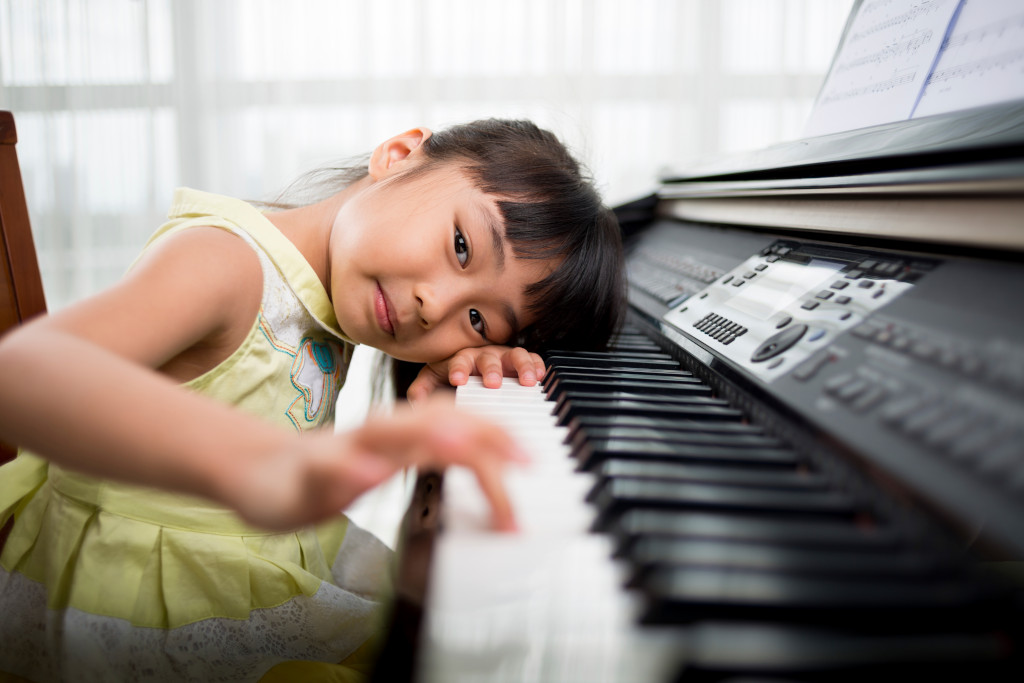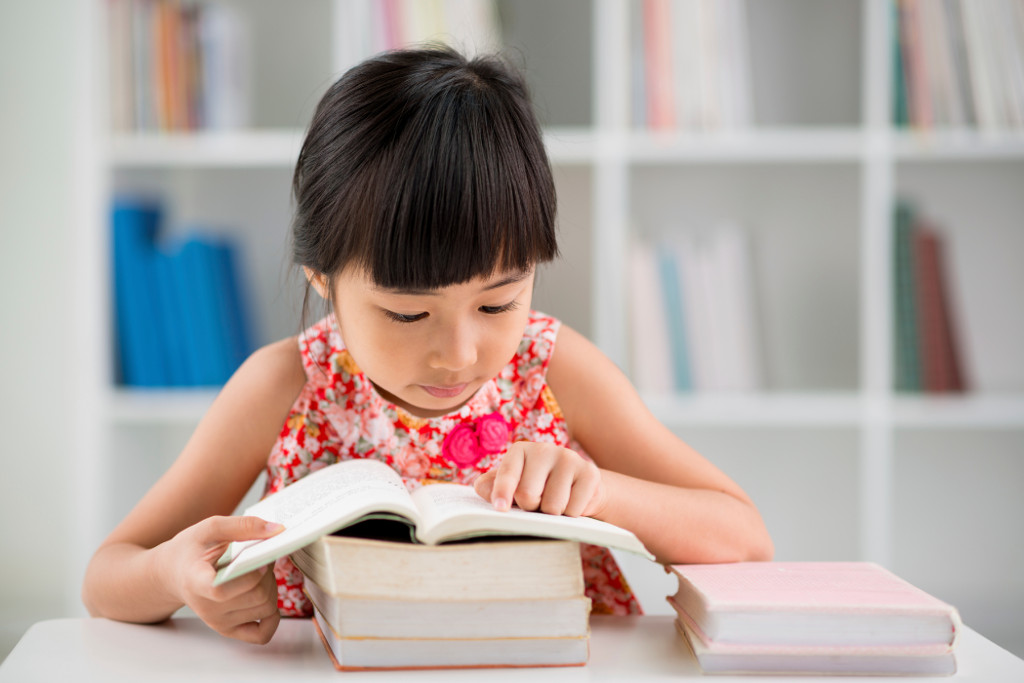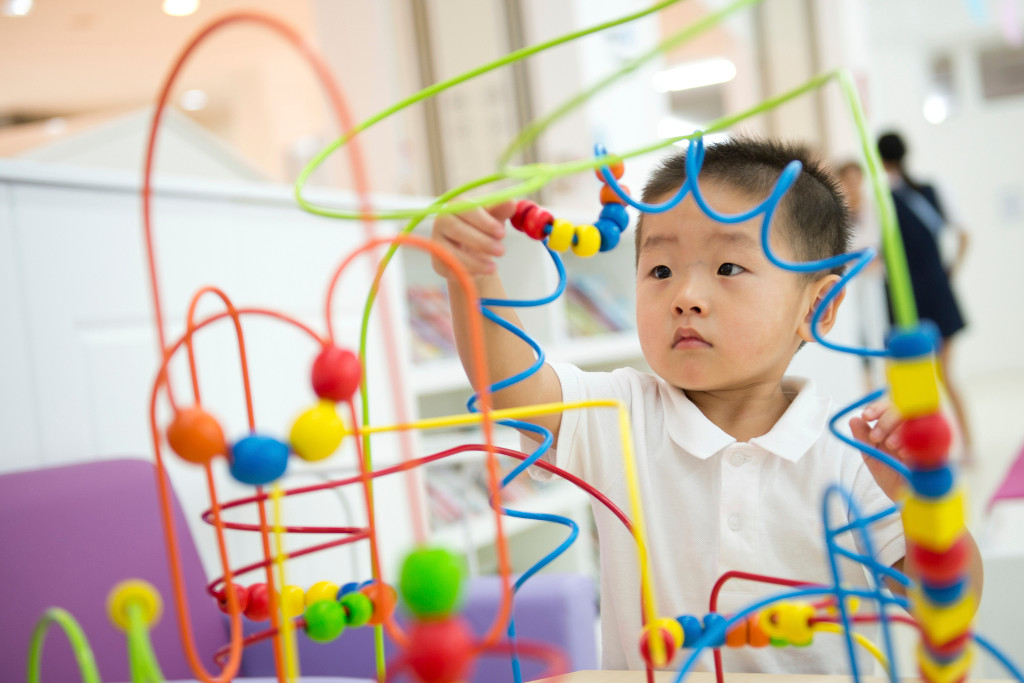SingaporeMotherhood | Baby & Toddler
June 2020
How to Support Your Gifted Children in Singapore

How do you identify a gifted child and what unique challenges do such bright young things typically face? We speak to experts and a mother of two gifted children for insights on how to help your little one thrive — intellectually, emotionally and socially.
When Patricia Koh’s firstborn son Victor was around one month old, she began noticing signs that he was developing at a different pace from other infants. For one, he was imitating the clicking sounds that she and her husband made to get his attention. At 18 months, he could speak coherently: “I am boiling water, do you want some tea?” he once replied a preschool teacher who asked him about the role-playing game he was occupied with.
(See also: 8 Ways to Boost your Baby’s Speech and Language Skills)
By the time he was around two years old, the toddler was able to read in complete sentences. “I first discovered he could read when I was reading the newspaper one day. He suddenly read the phrase ‘women at work’ aloud from an article. He has always been a curious learner and asked me to explain the article to him. After I did, he gave a little commentary about gender equality, saying that it is good that women in our country are encouraged to work,” recalls Patricia, an educator and author. She took him to Mensa Singapore — the society for people with an Intelligence Quotient (IQ) in the top two per cent of the population — where tests revealed his high IQ of 160.

Early Bloomers
Like Victor, gifted children can be identified by tracking their progress through various developmental milestones. In Victor’s case, he began reading earlier than other toddlers, who typically develop such skills between three and six years.
According to Pamela See, an educational and developmental psychologist at Th!nk Psychological Services, signs that indicate your child may be intellectually gifted include achieving milestones in different areas ahead of their counterparts. This, she says, is applicable across kids of various ages, including infants, toddlers, and preschoolers.
(See also: Toddler Developmental Milestones: 12 – 48 months)
Dr Wilson Chan, Mensa Singapore’s supervisory psychologist, adds that giftedness can be broad. “A gifted child is one who demonstrates great potential to excel in domains such as sports, performing arts, leadership, intellectual or academics. Identification allows the child’s innate potential or giftedness to be recognised, nurtured and developed,” he says.

“Intellectually gifted kids may develop more rapidly than their peers, adds Ms See. “They may exhibit advanced problem-solving skills, as well as the desire to master those skill sets. They may also pose questions that are more complex than those asked by children of the same age.”
Well-rounded Development
But identifying a gifted child is not just about earning bragging rights. “It is important to tailor learning needs according to your children’s abilities, while ensuring their social and emotional needs are met as well,” explains Ms See. This can help them cope with unique challenges such as difficulty connecting with peers due to their advanced intellectual development.
(See also: 13 Places to Bring Bub for Brain-boosting Fun and Creative Baby Activities)
“Some gifted children may face a fear of failure. While many find tasks simple at a young age, some tasks may require more effort or trial and error as they grow older, and they may have difficulty coping with this. They may also struggle with perfectionism, with any errors causing them emotional distress,” she further explains.

Patricia shares that Victor’s emotional maturity has called for a more cautious approach to parenting. “He has strong reasoning skills and thinks deeply. This means I have to explain things, be it relationship or other issues, to him from my own perspective. At the same time, I have to consider his perspectives so that he is not too affected by these issues,” she says.
Victor has a younger brother who is also under the Junior Mensa programme, so Patricia has her hands full. She reveals that the elder of her two kids tends to feel empathy and injustice more intensely. However, she states that it is important not to brand gifted kids as overly sensitive. Often, their acute sense of empathy may actually stem from deeper thought processes.
(See also: Depression in Children: Signs, Causes and Solutions)
Parental Guidance
How, then, do you help your gifted children cope emotionally? Ms See recommends social skills training as well as counselling to help them understand their difficulties and manage them individually. But she also cautions that one size doesn’t fit all. “Every child is different, therefore there is no template when it comes to supporting gifted children. It is important to take into account each child’s emotional maturity and areas of giftedness.”

“The rule of thumb would be to ensure that the child is getting their social and emotional needs met, and not all efforts placed on their intellect,” she elaborates, adding that psychological evaluations can be helpful if gifted children are struggling to manage. Understanding their strengths and weaknesses will help mitigate areas where they need help in.
For Patricia, a desire to understand her sons’ strengths and weaknesses led her to Mensa Singapore. There, junior members can participate in activities to stimulate the intellect and build social skills. These include outings to places such as Kidzania, as well as coding workshops and music appreciation classes.
(See also: 12 Not-so-ordinary Arts Activities That Give Your Child an Extraordinary Talent Boost)
However, Dr Chan notes that such outlets for support should not take the place of parental guidance. “Often, parents are the child’s first and most influential teachers. Nonetheless, interaction with teachers and peers in different settings is also important in promoting a gifted child’s healthy growth and development,” he says.
Research tells us that no amount of formal teaching or programmes can compare to the daily influence that parents have on their gifted child in facilitating their emotional and intellectual development.
Dr Wilson Chan, supervisory psychologist, Mensa Singapore
Gifted Programmes – To enrol or not to enrol?
So when is the right time to consider seeking additional support for your gifted child? Ms See advises parents to consider if their child is socially and emotionally ready for a more stimulating programme, and if they are bored with the main curriculum and current level of learning. “Speak to your child about the programme; there is no harm getting their input before making a decision. It is too soon to place your child in such programmes if they would cause them extra pressure from parents and teachers to constantly be successful, and if your child would be frustrated due to the programme’s demands,” she asserts.
Similarly with the Ministry of Education’s Gifted Education Programme (GEP), it is important to consider various factors before enrolment. “Parents need to carefully consider if their gifted child has the emotional resilience and is ready to handle the intellectual rigours, as well as the academic demands, of the GEP to fully benefit from the curriculum. Otherwise, the child may struggle to cope, experience undue stress and lose confidence,” says Dr Chan.
(See also: Deanne Chong-Duffield, mum & founder of GUG (Growing Up Gifted), on passion, obsession, and gifted education)
Lastly, while raising gifted children may require a different approach, Ms See points out that expectations of behaviours should be consistent for all children within the household. “However, when explaining reasons of behaviours, this should be tailored according to each child’s level of understanding,” she says. For Patricia, arguments between her gifted sons Victor and Valerian are common, but each child has his own way of dealing with conflict. Valerian, for instance, prefers his own time-out sessions to simmer down, which the family respects.

“We must always bear in mind that gifted children, like all children, are learning about society and their environment as they grow. They deserve the same care and warmth that other children receive too. If their gifts are harnessed and viewed positively, they can maximise their potential to help others flourish,” says Patricia.
Useful Links for Parents of Gifted Children
- Mensa Singapore
- Th!nk Psychological Services
- Singapore Chess Federation
- Khan Academy
- Johns Hopkins Center for Talented Youth
Schools and Enrichment Centres with Gifted Programmes
- MOE schools offering GEP (academic programme)
- Nanyang Academy of Fine Arts (arts programme/enrichment)
- MOE Junior Sports Academy (sports programme)
- Growing up Gifted (preschool)
- Gate Junior (preschool)
- Kindercampus (preschool)
- Gifted and Talented Education (preschool/enrichment)
- The Gifted Lab (enrichment)
(See also: Groom Your Future Olympian at These Top Sports Academies for Kids)
All content from this article, including images, cannot be reproduced without credits or written permission from SingaporeMotherhood.
Follow us on Facebook, Instagram, and Telegram for the latest article and promotion updates.




